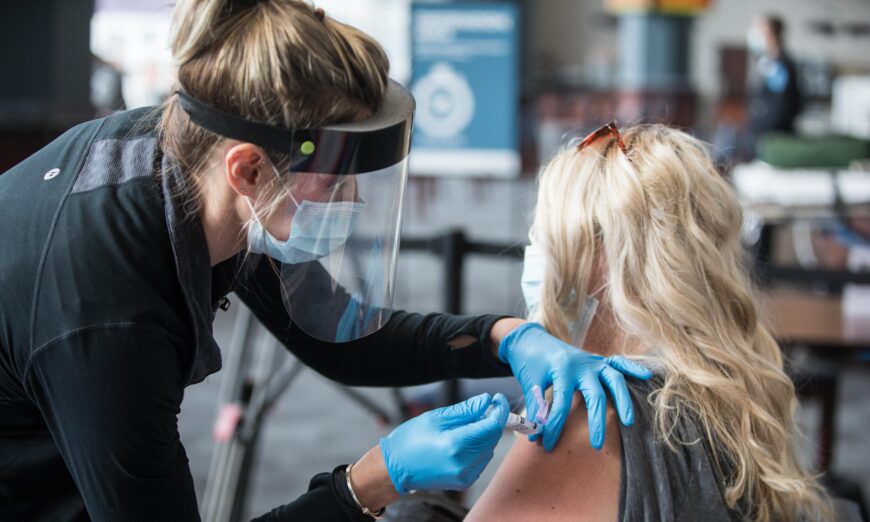Every Additional 4 Years in Age, Risk of Dying Per COVID-19 Injection Doubles: Study
The doubling in mortality risk is significantly higher compared to terminal illnesses such as cancer, pneumonia, and heart disease.
Older people are at increased risk of dying from COVID-19 vaccines, with the risk of death doubling roughly every four years, according to a recent study that has not undergone peer review.
By dose four, or the second booster, the risk of death per injection reaches 5 percent, or an average of 1 death per 20 injections.
This doubling in mortality risk per COVID-19 injection every 4–5 years is about two times faster than the 10-year doubling rate of the yearly risk of death due to key old-age illnesses such as cancer, pneumonia, and heart disease.
The 5 percent risk of death per COVID-19 vaccination among people aged 90 and above in Chile and Peru is much larger compared to these numbers in other countries. For instance, other studies have found the risk of death per COVID-19 injection to be at 1 percent among all ages in India, 0.55 percent for 80+ year-olds in Israel, and 0.93 percent for 85+ year-olds in Australia.
“This turns the public health policy of prioritizing elderly people for injection with COVID-19 vaccines on its head,” the study authors wrote.
Such public health policy is based on two false assumptions, they said. The first is that there is a constant “age-independent” risk of death per injection. The second is that the risk of death per injection is a “small value,” which is based on optimistic estimates from “managed trials funded by the pharmaceutical industry.”
“Our research shows that both assumptions are false and far from reality in the field, on the scale of nations,” the study read. “Prioritizing elderly people for COVID-19 vaccination, in the absence of relevant data, was reckless.”
The high risk of death per injection should make governments halt “the baseless public health policy of prioritizing elderly people for injection with COVID-19 vaccines until valid risk-benefit analyses are made and publicly reported,” according to the study authors. “The same may be true of seasonal influenza vaccines.”
17 Million COVID Vaccine Deaths
The 17 nations analyzed in the study are Argentina, Australia, Bolivia, Brazil, Chile, Colombia, Ecuador, Malaysia, New Zealand, Paraguay, Peru, Philippines, Singapore, South Africa, Suriname, Thailand, and Uruguay. Together, they make up 9.10 percent of the global population and 10.3 percent of worldwide COVID-19 injections.

The study calculated that there were about 1.74 million deaths caused by COVID-19 vaccination in the 17 nations. Extrapolating this to the global level resulted in an estimated 17 million COVID-19 vaccine deaths worldwide by Sept. 2, 2023.
Researchers found that in 15 out of the 17 nations in the study that had sufficient mortality data, there was an “unprecedented and relatively sharp peak or surge” in all-cause mortality during the January 2022 to February 2022 period, around the time of a rapid rollout of COVID-19 vaccine boosters while non-booster doses were also being administered.
“There can be little doubt that the mass COVID-19 vaccination campaigns caused the temporally associated excess mortality in the 17 countries of the present study and in other countries studied to date,” it said.
“If vaccines prevented transmission, infection or serious illness, then there should be decreases in mortality following vaccine rollouts, not increases, as in every observed elderly age group subjected to rapid booster rollouts.”
“And, mortality would not increase solely when vaccines are rolled out, where no excess mortality occurs prior to vaccine rollouts, as we have documented here, in nine countries across three continents.”
The researchers also noted that they have found “no evidence” in their analysis of all-cause mortality data that “COVID-19 vaccines had any beneficial effect.”
Warning Against Vaccination
Some studies related to the safety of COVID-19 vaccines have shown them to be safe, and others highlight their dangers.
For instance, a December 2022 study found that compared with a placebo, “most vaccines reduce or likely reduce, the proportion of participants with confirmed symptomatic COVID-19, and for some, there is high-certainty evidence that they reduce severe or critical disease.”
However, a June 2022 study of mRNA vaccinations found that “Pfizer and Moderna mRNA COVID-19 vaccines were associated with an increased risk of serious adverse events of special interest.”

“There’s essentially no evidence for it. There’s been no clinical trial done in human beings showing that it benefits people, there’s been no clinical trial showing that it is a safe product for people,” he said during a news conference.
“There are multiple studies now from around the world—Brazil, Australia, United States—that show that over time these vaccines, these mRNA COVID-19 products, actually increase your chances of contracting COVID-19.”






